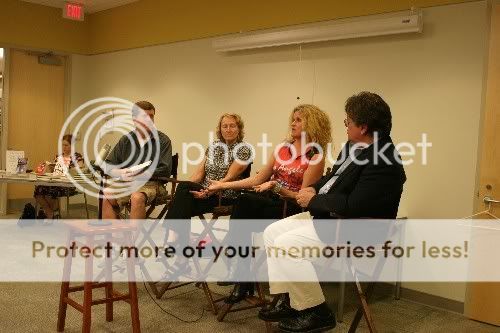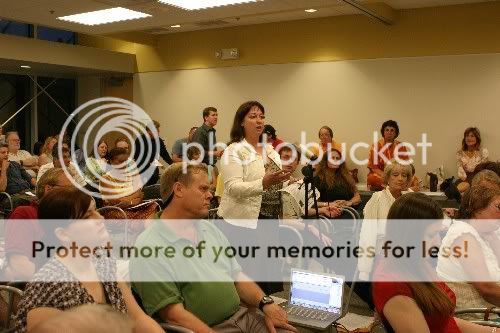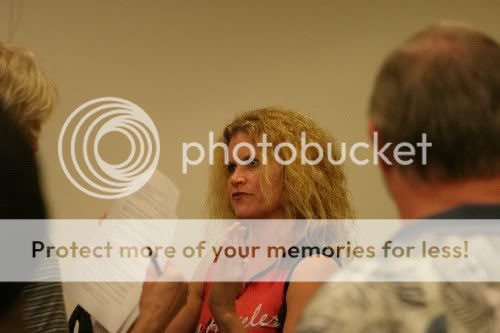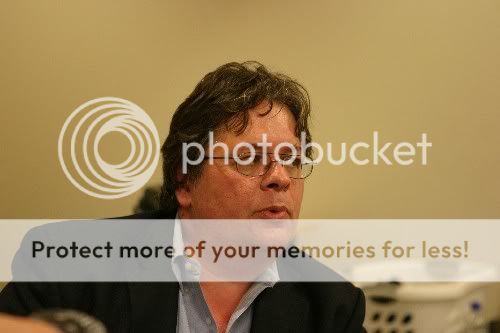(I was going to interview Guyot on his own TV career (or better yet, have him interview himself) to round out this series on television writing, but it just so happened that a pro did this very inclusive interview this week. So much the better! – Alex, returning next week)
The following is an interview with Paul Guyot, conducted by Patti McCoy-Jacob, book critic for the Yorba Linda Star newspaper, and http://isurfoc.com. The interview took place on September 13th, 2007, at the Island Hotel in Newport Beach, California.
I met Paul Guyot on a bright afternoon at Fashion Island in Newport Beach, California. He was dressed casually chic, and had an immediate affability about him. Though self-deprecating at times, one can tell he’s loves his work. He has a passion for the written word, and his eyes light up when he talks about the craft, and his admiration for those that do it well.
PMJ: What made you decide that writing was the way you wanted to make your living? Was it a decision that came gradually over time, or did you have some sort of epiphanic moment?
PG: I’ve been writing since Mrs. Parker’s 3rd grade class. How old is a third grader? I wrote parodies initially, then moved on to westerns in Mrs. Shattenberg’s 5th grade class, and finally to crime fiction in 8th grade. I can’t remember my eighth grade teacher’s name, but she kicked me out of class. Out of school, actually.
PMJ: Why do you prefer writing crime fiction over other genres?
PG: I think the mystery/crime story offers a built-in spine that’s attractive to me. A crime’s committed, there’s an investigation, and a resolution – good or bad. It’s clean. That’s my writerly answer. My personal answer is I have a very nasty, very dark side. I’ve walked a lot of places I never should have been. Writing about crimes keeps me from committing them.
PMJ: I assume your favorite television shows consist of cop or crime series?
PG: It’s certainly my favorite genre, but I’m a huge fan of THE OFFICE, and TWO AND A HALF MEN. For drama, I think hands down the single best thing on television is THE WIRE. Nothing else comes close. Season three of that show might have been the best single season of any television series in history.
PMJ: What are the major differences when you write for television as opposed to the printed page?
PG: Well, I have very little experience with prose, let’s make that clear. I’m a TV writer by trade, and have done that for years, my published prose is limited to several short stories, which have been published in anthologies, or original fiction web sites. I’ve had good response – a story I wrote for Bryon Quertermous’ outstanding Demolition site was chosen as a notable short story in 2006.
PMJ: Do you have plans to ever tackle a novel?
(Guyot grins) PG: The one question I was hoping you wouldn’t ask. Yes, yes, yes, I, like every other poor slob in this country, am working on a novel. I was scheduled to be done the second week in August, but my day job got in the way, as it always seems to do. But I think, after years of toying with the idea, I’m actually executing it now. I’m past the 55,000 word mark, and it’s still holding up. My goal is to get those last thirty or so thousand words down by Thanksgiving. (Laughs) God, I know as soon as Battles and Browne read this, I’m dead.
PMJ: Battles and Browne?
PG: A couple of writer friends – Brett Battles and Robert Gregory Browne – both published authors, who have been on me like corrosion on Britney to finish the freaking thing. I started back in January, just before we all got met at a writing conference in Seattle, and I made the mistake of opening my mouth about it.
PMJ: Speaking of which, do you have a favorite U.S. city?
PG: Chicago, despite the fact Sean Chercover lives there. Sorry, another writer name I’m dropping. I’ll stop. I love Chicago. It’s beautiful, and dangerous, and has amazing food, great architecture, good sports teams, and the people there are – in my experience – the nicest, most genuine people in the country. They’re like Canadians with poorer table manners.
PMJ: Are you working on any television series right now?
PG: I am. I recently sold a pilot to A&E network. It’s a cop show, big surprise, set in St. Louis, another shocker. It deals with the themes of idealism versus pragmatism in our country today. The whole red state-blue state thing, does idealism even exist anymore, all done inside the world of a cop show.
PMJ: Sounds intriguing.
PG: I’m really excited about it. Peter Horton’s directing. He did the pilot to Grey’s Anatomy and a bunch of other stuff. He’s great. He and I actually came up with the story together. And he loves the idea of it being in St. Louis. We haven’t seen a cop show set there, and there are a lot of crime stories we can tell that wouldn’t be part of a cop show set in New York or LA.
PMJ: Now, you live in St. Louis, right? Did you place the show there because of the familiarity?
PG: It’s funny, in the last four years I’ve written four pilots – all set in St. Louis. The first two pilots got made, meaning they were actually filmed, but I was forced to rewrite them – to change the location.
PMJ: Why?
(Guyot pauses before answering) PG: Well, the first one was because the Missouri Film Commission dropped the ball – I had a studio willing to go to St. Louis, but the film office was, let’s just say, not paying attention. And the second one was rewritten for New York because of an idiot producer – who had more juice than I did – was on the project. He lived in New York, and literally didn’t want to travel anywhere to shoot the pilot. Changing it from St. Louis to New York was like changing The Sopranos from Jersey to Bakersfield – it’s just not gonna be the same show.
But when I write, I don’t set things in StL simply because I know the place, but rather because I love it. I love the town, and think it works on many levels as a setting for stories. But just as Connelly will reveal the ugliness of his beloved LA – and the Bosch novels are love letters to LA – I will show elements of the Arch City that wouldn’t make the Chamber of Commerce brochure.
PMJ: Are all your short stories set in St. Louis?
PG: No. My story in GREATEST HITS (Carroll & Graf, 2005) was mostly set in Scottsdale, Arizona, where I grew up. I did that for my parents, since it was my first published work. And my story for HOLLYWOOD & CRIME (Pegasus, 2007) had to be set in Hollywood for obvious reasons. But the next one I have coming out is definitely set in St. Louis.
PMJ: Out of all of your produced work, both in TV and print, is there any single one that stands out as your all-time favorite, and if so, why?
PG: A story I like quite a bit won’t be out until next spring. I have a short story in the upcoming MWA (Mystery Writers of America) anthology BURDEN OF THE BADGE. It’s edited by Michael Connelly, and the story was chosen from a hundred or so blind submissions and it’s the first prose work that I don’t wince at.
As for screenwriting, I wrote a JUDGING AMY episode that, not only was hardly rewritten at all – a rarity in TV – but it went on to win an award. That felt pretty good. The single thing I’m most proud of is a pilot I wrote for Sony last year called I.D. It’s about a cop deep, deep undercover inside a criminal organization, and the hook is that for the first season the audience isn’t told who the cop is – they have to guess. I really loved the concept and the script came out great.
Unfortunately, due to a myriad of reasons involving politics and paranoia, the script was never really shown to any of the networks. But I get the rights back in fourteen months and I’m going to make it myself. But I must admit, my greatest moment as a writer was when I learned that entry in the Bulwer-Lytton fiction writing contest – for the worst opening lines you can think up – not only won honorable mention, but was chosen to be included in the contest’s newest anthology, IT WAS A DARK AND STORMY NIGHT.
PMJ: Do your have any type of trademark in your stories? Something that people would expect to come across when reading a story by Paul Guyot?
PG: My trademark, or signature, is very mediocre writing. If you read a story, and at the end go, “Eh,” that was probably a Paul Guyot tale.
PMJ: I doubt that. If you had to choose, what would give you greater satisfaction – writing a pilot that makes it onto the air and becomes a series, or writing a number one best-seller?
PG: No contest, writing the book. I recently told a friend – in all honesty – that I would rather make fifty grand a year writing books than make three hundred and fifty grand doing television. I know that statement rubs people the wrong way, but it’s usually those who haven’t ever made that kind of money. I’ve seen both sides of it – I’ve made tons of dough, and I lived off of Top Raman – and I now know the cliché is true: money doesn’t buy happiness. You can rent it for a while, but in the end, we’re all playing with the House’s money.
PMJ: Who are your favorite authors, and why?
PG: I can’t say enough about James Lee Burke. Knocks me on my ass every time. Updike, Pelecanos, Lippman, Eisler (though I hate him for his hair), Lehane, Coetzee. For the screen, Chase and David Simon always blow me away. When I go old school it’s with John D., Chandler, O’Conner, Cain. Names not quite as well known (yet) that impress me are Dave White, Duane Swierczynski, Alex Sokoloff – a recovering screenwriter – and a guy named Phil Hawley.
PMJ: Do you try to pattern your style of writing after any of these favorites, and if so, which one(s) and why?
PG: I’ve made that mistake before. I think most newer writers – who are still searching for their voice, or simply lack confidence as I did – do this at some point. The writing will always suck when you’re attempting to emulate someone (consciously or unconsciously), but I think it’s a good exercise in a way, because writing anything – even pure garbage – is better than not writing.
PMJ: Do you subtly or overtly incorporate into your stories people you know personally? Has anyone ever recognized themselves?
PG: I’ve never put someone I know down on paper. I may use a real person as inspiration, or take aspects of their behaviors or attitudes, because I like creating my own characters. As for using real people’s names – I love doing that. In the HOLLYWOOD & CRIME anthology, I have a story called Barry of Hollywood. It’s a goofy little PI romp and I think every character other than the lead is named after a friend of mine, or someone I know.
One of the more unlikable characters carries the name of an idiot producer I once worked with. Then there are several writer friends whose names make appearances. One funny thing – I gave a character the name Swierczynski, after Duane – but changed it when I got grief from the editor, not because it was unpronounceable, but because it was TOO obvious I was using a famous author’s name.
PMJ: I can tell you enjoy your work. What’s your favorite part of the actual writing process?
PG: Yeah, I love writing. I roll my eyes whenever I hear writers talk about how they hate to write, or how they wish they could do something else. Please. They say that because it’s good copy, and it sounds like they’re really busting their ass as opposed to sitting around day making up stories. Yes, writing can hard, excruciatingly difficult at times, especially during deadlines. But any write who says they hate it is full of shit. Writing is possibly the greatest job one can have.
It’s what we did as kids – make believe. And that’s my favorite part, to get to your question. The creation of the characters is what I love. I like telling stories, but I get the most pleasure when I have a guy walk into a room and there’s three people in the room. Who are they? What do they look like? Where are they from? Why are they there? Not only do I get to give them ticks, and weird features and behavior, but I get to decide why they’re there, what they want. I get to play God – I create people. I love that part.
PMJ: You mentioned authors you admire, or who may influenced you, is there anyone you’ve known personally that has had the greatest influence on your writing, and in what way?
PG: I owe Michael Connelly a huge debt of gratitude. It’s been mentioned before so I won’t bore you with it, but he was basically the first writer to ever tell me – you can do this. He also exposed me to Mystery Writers of America – a great organization – and the entire crime writing community. As a screenwriter, JJ Abrams and the Hall sisters (Barbara and Karen), who wrote and produced JUDGING AMY, are others who taught me a lot, personally and professionally.
PMJ: When you are working on a story, do you aim to write a certain amount of words per day or to write for a certain amount of hours per day?
PG: For me, I am at my most productive, and creative best, when I am on a strict schedule. Not so much a word count as a time count. I start at the same time every day, and write until the same time, or until I’ve accomplished enough, either number of words, or development of story.
PMJ: Do you have a set writing schedule during the week, or is each day different depending on the circumstances for that particular day?
PG: I try to write five days a week. Weekends are for family, and I only work if I’m on deadline. As I said, I always try to start my workdays at the same time, and go for the same number of hours. I’ve tried the “just work whenever it comes” method, but that disastrous. See, I lack discipline. This year has been one of the most, if not thee, most productive year of my career, from a word count standpoint. And I attribute that to a solid schedule. Basically since the spring, I have been waking up, going to the gym immediately – I highly recommend working out for writers, we’re all such sloths by vocation – then turning on my computer in the same spot, by the same time, usually nine, every morning. And I write until four.
PMJ: All right, last question, then you can go…
PG: Are you kidding? It’s gorgeous here, I’m never leaving. Even after the interview, I’m just going to sit here. Newport is definitely a place I could write. No wonder Jeff Parker does such good work – doesn’t he write around here?
PMJ: Out of everything you’ve learned about writing over the years, is there any one best piece of advice you could give to others who are serious about improving their writing?
PG: Aw, crap, I hate this question. It’s a subjective subject and subjective answer. I can rant and rant about this. There are so many people that think simply getting a book deal, or a script sold means they are a good writer. It doesn’t. I can’t tell you how many bad writers there are out there making a living. But hey, it’s subjective, like I said. Some people, maybe a lot of people, might think I completely suck. And I’m making a living.
But for me, I can tell within five minutes of meeting a writer whether or not they truly know anything about the craft. It’s painfully obvious when they open their mouths and start spewing their expertise that they are simply a victim (or beneficiary) of timing, and that’s how they got published or got a film or pilot made.
If I really had to give advice – pity the person coming to me for advice on anything – I would say that, for newer writers, folks who think they might want to give writing a try, because it seems like a cool way to make a living, don’t. Because you’ll suck. For newer writers who have a gut-churning desire to write, to tell stories, but feel they don’t know how to go about it, just do it. Start writing anything. Grocery lists, list all the people you want to get even with, list all the Jackson Browne songs that sound the same, write anything. Just write. And read. Reading and writing are the two best teachers in the world.
My advice for those who have already a novel or a screenplay, and are wanting to know how to get an agent, or get published, or get their opus into the hands of Steven Soderbergh, is keep writing. Chances are great that your manuscript or screenplay isn’t nearly as good as you think it is. I always laugh when I meet someone who says they have a screenplay or novel and they’ve done one rewrite on it, or sometimes none! And they think it’s gold. I’m sitting there going, “Okay, people like Cormac McCarthy and JM Coetzee, and Steve Zaillian rewrite the shit out of their stuff, but yours can’t be improved. Uh, huh.” Learn to rewrite. I’m not saying never let go of something, not at all, I’m saying, just as you’re never as bad as you think you are, you are certainly NEVER as good as you think are.
PMJ: Paul, thank you so much, this has been fun.
PG: Thank you.
Paul Guyot wrote and produced the CBS drama JUDGING AMY for three years. Before that he wrote for shows such as FELCITY and LEVEL 9. He has written pilots for Sony Pictures, Warner Brothers, Fox, TNT, Lion’s Gate, and A&E.











